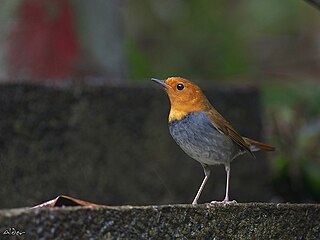
The Japanese robin is a small passerine bird in the family Muscicapidae. This species was formerly named Erithacus akahige, or Komadori. Its range extends from the south of the Kuril and Sakhalin Islands throughout Japan.
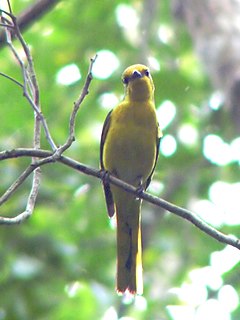
The minivets are passerine birds belonging to the genus Pericrocotus in the cuckooshrike family Campephagidae. There are about 15 species, occurring mainly in forests in southern and eastern Asia. They are fairly small, slender birds with long tails and an erect posture. Many species have bright red or yellow markings. They feed mainly on insects, foraging in groups in the tree canopy.
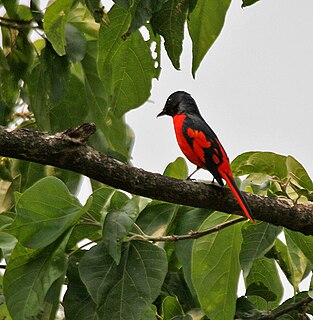
The scarlet minivet is a small passerine bird. This minivet is found in tropical southern Asia from Northeast India to southern China, Indonesia, and the Philippines. They are common resident breeding birds in forests and other well-wooded habitats including gardens, especially in hilly country. While the male of most subspecies are scarlet to orange with black upper parts, the females are usually yellow with greyish olive upper parts. Several former subspecies have been elevated to a species status in recent works. These include the orange minivet. All subspecies have the same habits of gleaning for insects and are often seen in mixed-species foraging flocks, usually foraging in small groups, high up in the forest canopy.

The Nansei Islands subtropical evergreen forests is a terrestrial ecoregion of the Ryukyu Islands, also known as the Nansei Islands, in Japan. The Nansei Islands are an island arc that stretches southwest from Kyushu towards Taiwan. The larger islands are mostly high islands and the smaller ones mostly coral. The largest is Okinawa Island. The highest point is Mount Miyanoura on Yakushima Island at 1,936 metres.

The white-bellied minivet is a species of minivet found in Nepal and India, mostly in dry deciduous forest.

The Palau ground dove is a species of bird in the family Columbidae. It is endemic to Palau, living in forests. The IUCN has assessed it as an endangered species.

The ashy minivet is a passerine bird of eastern Asia belonging to the minivet genus Pericrocotus in the cuckooshrike family Campephagidae. While most of the minivets have shades of yellow, orange and red in their plumage, this species has only greys, whites and blacks. The male is distinctive with a white face and black nape although females can be confused with the female of the brown-rumped minivet. They forage in the canopy, often along with other minivets and join mixed-species foraging flocks.

The ashy flowerpecker is a species of bird in the family Dicaeidae. It is endemic to Indonesia where it occurs on Seram, Ambon and nearby islands in the Banda Arc. Its natural habitats are subtropical or tropical moist lowland forest and subtropical or tropical moist montane forest.

The moustached babbler is a species of bird in the ground babbler family Pellorneidae. The species is also known as the brown-headed babbler or brown-headed tree-babbler.

The short-billed minivet is a species of bird in the family Campephagidae. It is found in Bangladesh, Bhutan, Cambodia, China, India, Laos, Myanmar, Nepal, Thailand, and Vietnam. Its natural habitats are subtropical or tropical moist lowland forest and subtropical or tropical moist montane forest.

Swinhoe's minivet or the brown-rumped minivet is a bird in the cuckooshrike family, Campephagidae. The species was first described by Robert Swinhoe in 1861.
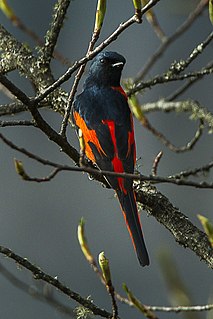
The long-tailed minivet is a species of bird in the family Campephagidae. It is found in southern and south-eastern Asia where it occurs in Afghanistan, Bangladesh, Bhutan, China, India, Laos, Myanmar, Nepal, Pakistan, Thailand, and Vietnam. Its natural habitats are subtropical or tropical moist lowland forest and subtropical or tropical moist montane forest.

The fiery minivet is a species of bird in the family Campephagidae. Its range includes Thailand, Malaysia, Indonesia and the Philippines. Its natural habitats are broadleaf, secondary and coastal forests. It is threatened by forest clearance and has been assessed as near-threatened by the International Union for Conservation of Nature (IUCN).

The little minivet, also known as the Flores minivet, is a species of bird in the family Campephagidae. It is endemic to Indonesia. Its natural habitat is subtropical or tropical moist lowland forest.
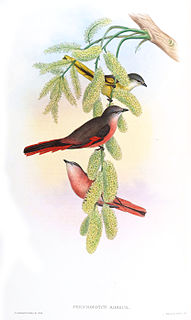
The rosy minivet is a species of bird in the family Campephagidae. The male is distinguished from other minivets by having a deep pink/light red shade in wings and tail and the female having an olive/olive yellow rump as against bright yellow in other minivets. Both male and female are grey above.

The grey-chinned minivet is a species of bird in the family Campephagidae. It is found from the Himalayas to China, Taiwan and Southeast Asia. Its natural habitat is forests about 1,000–2,000 m (3,300–6,600 ft) in elevation. The International Union for Conservation of Nature (IUCN) has assessed it as a least-concern species.

The Andaman woodpecker is a species of bird in the woodpecker family Picidae. It is endemic to the Andaman Islands in India. Its natural habitat is tropical moist lowland forests. It is threatened by habitat loss.

The ashy woodpecker is a species of bird in the woodpecker family Picidae. It is endemic to Sulawesi and surrounding islands in Indonesia. There are two subspecies, the nominate race M. f. fulvus, which is found in northern Sulawesi, the islands of Lembeh and Manterawu, and the archipelagos of Togian and Banggai; and M. f. wallacei, from southern Sulawesi and the islands of Muna and Buton. The second subspecies is named for the collector and scientist Alfred Russel Wallace.

The orange minivet is a brightly colored bird in the cuckooshrike family, Campephagidae. It is found all along the Western Ghats and west coast of India and Sri Lanka. It was formerly considered a subspecies of the scarlet minivet which is considered to have a wider distribution in eastern and northern India and South-east Asia. Its natural habitats are temperate forests, subtropical or tropical moist lowland forest, and subtropical or tropical moist montane forest. The orange minivet is a species resident in southern India and Sri Lanka, that feeds primarily on insects while foraging in mixed-species bird flocks or in small single-species groups.

Amami-Ōshima Island, Tokunoshima Island, northern part of Okinawa Island, and Iriomote Island (奄美大島、徳之島、沖縄島北部及び西表島) is a serial UNESCO World Heritage Site consisting of five component parts on four Japanese islands in the Ryukyu Chain of the Nansei Islands. The site was selected in terms of biodiversity for having a diverse ecosystem of plant and animal species that are unique to the region.





















